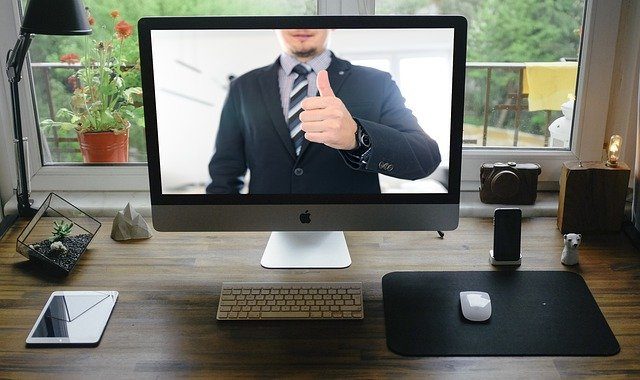The Online Master of Business Administration admissions process, in many cases, includes an admissions interview. According to Indeed, a career guide website, the purpose of an MBA interview is to convince the admissions team that the applicant belongs in the program. The interview is offered to applicants that the team thinks are promising prospects. We will highlight the interview processes, examine the different types of interviews, work through nerves, offer tips, and plan to master the online MBA admissions interview.

Application Process
It is important that students remember that admissions teams look at the online MBA package. Each part of the package holds weight. The admissions interview is one part. The application process, in a nutshell, has about six components. But there are variations based on the school. First, students begin by creating an account and completing an application. Second, students must request that their official transcripts be sent over from the accredited university where they earned their bachelor’s degree. Third, students take the graduate admissions test of their choice: Graduate Record Examination (GRE), Graduate Management Admission Test (GMAT), or the Executive Assessment (EA). The fourth step for students is to request and submit professional or academic letters of recommendation. The fifth step is to upload a resume or curriculum vitae. Finally, the sixth and final step is the online MBA interview. An online Master of Business Administration admissions interview is not a part of every admissions process. Each school and program is different and has a different set of requirements and expectations. Even the types of interviews vary.
Mandatory or Voluntary Interview
Is the online MBA interview mandatory or voluntary? There are hundreds of accredited online MBA programs. We will take a closer look at some of them. According to US News and World Report, the top online MBA programs, in order, are at Carnegie Mellon University, University of North Carolina-Chapel Hill, Indiana University, University of Southern California, and the University of Florida. Each of these schools includes an interview in their selection process. At Carnegie Mellon, there is an application process referred to as ‘chart your path,’ and the school records whether you have completed all of the steps. The interview is the last step so that after the application speaks, students can verbally share their stories with the admissions team.
Before scheduling the interview, students can watch their “demystifying the Tepper Interview” for some keys to success. The interview at Carnegie Mellon’s program is a behavioral interview, like many job interviews. We will discuss those more later. Once students have completed the admissions application at the University of North Carolina, an admissions counselor contacts the applicants for a personal interview. Indiana University, on the other hand, begins the application process with an invitation to interview. Then students submit their application and supporting documents. For each of these schools, an interview is required to decide for admission. However, the process is slightly different for the University of Southern California (USC) and the University of Florida. At USC, interviews are conducted by invitation only once an applicant has completed all application steps. For UF’s two-year online MBA program, applicants may be invited to complete an interview to make a sound decision. For some schools, an interview may not be required, like at the University of Texas-Dallas. In other cases, schools may request a case-by-case interview basis, like the MBA offered by Pennsylvania State University’s World Campus. Both UTD and Penn State’s programs rank at number seven in the nation. If a school has an interview as a part of its admissions process, it is usually safe to say that it is mandatory for qualifying candidates. Spend some time preparing to present well.
Types of Online MBA Interviews
There are a few different types of interviews: open, by invitation, individual, group, blind, and non-blind. Few schools have open interviews. Duke’s Fuqua and UNC’s Kenan-Flagler are among them; however, Kenan-Flagler has canceled open interviews due to COVID-19. Fuqua is offering open interviews during each application round. To participate, applicants must have at least completed the biographical portion of the application. Open interviews allow students to show initiative and establish a relationship with the college. Those with discrepancies in their applications, like low grades or low test scores, could benefit from doing well in an open interview. Offering to interview can pressure the applicant; they do not have to wait to receive an invitation but sign up. It can also show dedication and strong interest in the program. Students can only sign up for open interviews during a specific period. After that time, students will only interview when invited by the admissions team. Clear Admit suggests that business schools are so large that they cannot accommodate open interviews because they would not have the capacity to interview everyone.

Individual interviews are standard. Group interviews, however, are a part of the interview process at the University of Michigan’s Ross School of Business. In group interviews, there are group discussions and exercises. This interview-style assesses how well applicants work on teams, whether they can communicate, come to a consensus, and problem solve. In this setting, it is essential not to give false information or try to show off. Instead, be a team player, demonstrate leadership, think creatively.
Finally, in a blind interview, the interviewer enters the conversation with very little information about the candidate. So the applicant needs to give a clear picture of who they are through the answers to the questions. A non-blind interview is just the opposite. The interviewer can have the application, the resume, or no portion of the application. At Duke’s Fuqua School of Business, the interviewer only has a resume. In any case, when an interviewer knows any part of a person’s application, they are likely to ask specific questions about it.
Online MBA Interview Components
If someone scours the internet, they can find several sample online MBA interview questions. There are a couple of realities to face. They will not be asked all the questions, but they can plan for a few typical questions and use some for general practice. This may be what they did to practice for the GRE or GMAT. We will share a few key questions to get interviewees thinking about their intentions and what they bring to the table.
Here is what students can expect in an online MBA interview. Online MBA interviews can last 30-45 minutes. Typically, the standard attire for the interview is business casual or business professional. They should be sure to double-check on the school’s website. At North Carolina State, students can expect to answer questions about their academic and professional experience, career goals, leadership, and teamwork.
Some of the things that interviewers are looking for in the questions are professionalism, leadership, motivation, authenticity, humility, and self-awareness. An interviewer may lead with background questions and end with behavioral questions. We can think about the MBA interview in four sections. Let us begin with background questions. Mba.com lists some of the typical questions in an online MBA interview. An interviewer may start asking the interviewee to share a little about themselves. One recommendation for tackling the question is to talk about their undergraduate major and why it was chosen, work accomplishments and experiences, career goals, or what values determined their choice of industry. The question should be answered in no more than three minutes. Other questions may include why the applicant wants to earn a business graduate degree and chose this particular school. They could ask about long-term goals and short-term goals. The recommendation for this question is to research and answer questions thoughtfully. Answers about their motivation can include career goals, skills they plan to gain, how they plan to apply them, and why this is the optimal time to head in that direction. In speaking to this particular school’s program, it would be wise to include something about the culture or values of the school, the faculty, or their connections in the business industry.

Moving on to the leadership question, an interviewer may ask questions about their quality as a scholar or leader. The first of those questions may be why the school should grant them admission. This is a straightforward question that can be off-putting. But it is essential to return with a direct answer and support the statement. This is an excellent time to highlight accomplishments and skills that have positively impacted their career. They should mention how those qualities and experiences will benefit the program. A typical request to follow is to describe leadership accomplishments. Some pre-work would be to think of several instances of demonstrated leadership, either career or volunteer related, and the results and the impact of their skills in those situations. This is also a time to include any lessons learned. Finally, the most common question in an interview is, “what are your strengths and weaknesses?” This is a time to tell stories. For weaknesses, tell stories of triumphs over shortcomings. Additionally, share unique strengths by painting a picture of the qualities and how they yield positive outcomes.
Speaking of storytelling, this is also how one goes about answering behavioral questions. One request may be to share a situation where they experienced failure, a time when they were faced with an ethical dilemma, or overcame an obstacle. Indeed suggests using the STAR method to form responses. Students should give the listener context on the situation; S stands for the situation in the acronym. The T is for the task. The interviewee needs to share what their responsibility was in the situation. Then they should share what they did to solve the issue; A is for action. Finally, it is essential to talk about the outcome. R is for the result. Finally, the applicant may be asked if they have questions about the program or the school to close an interview. Having one to two genuine questions in the arsenal is wise, as sometimes, questions do not always organically arise in the conversation.
Tips for the Online MBA Interview
Interview preparation can be tricky because there is not a single play-by-play to follow. The Cox School of Business has some tips for before and during the interview. Of course, they suggest that students spend time preparing for the interview by researching the school, looking through common interview questions, and thinking through the main points of those answers. The Cox School of Business at SMU recommends preparing for their interviews by going through mock interviews with a friend.
During the interview, listen to questions, pause to internalize what is asked, then respond. Breathe. Maintain composure. Try not to memorize answers to questions, but be thoughtful about responses. Students should remember what they put in the application in case it is referred to in the interview. When asked about accomplishments, they should speak confidently. When asked about strengths and weaknesses, demonstrate self-knowledge and awareness. Frame experiences, even imperfections, as strengths. Give clear, brief responses. Finally, limit conversation around things that do not point to accomplishments, goals, or the online MBA at their school. Keep career goals in mind. Be both conversational and professional. The Cox B-School puts it this way, before the interview, the interviewer will have made a connection with the interviewee. The interview is where they expect to solidify the relationship. Rest in knowing that the point of an interview is not to trick or trip the applicant. The point is to get to know the applicant. They want them to be prepared and confident.
Recognizing the Nerves in Interviews

The Online MBA Admissions Interview can be one of the most dreaded portions of the application process. Interviews, in general, have an intimidation factor. The truth is, interviews can be scary. Those being interviewed can experience anxiety because of the circumstance they are in. Students can be nervous because the fate of their acceptance is in the hands of someone. Then there is an uneasiness as they wait in uncertainty for the results.
There are tons of unknown factors. Who knows who will conduct the interview, how many people will be a part of the interviewing process, or whether they will be friendly. For some, their body sends them nervous signals, their heart rate increases; their body shakes, their voice cracks, they sweat profusely, etc. There may be an urge to feed off the interviewers’ energy rather than combat it for more empathetic folks. That looks like shrinking back or being aggressive because others are. Intimidation can run wild. But a student that has made it in the room is qualified to be there. It is not easy to stay composed and exude confidence in an interview, but it is doable. Interviews feel scary because they are essential. To do well means to earn acceptance. To do poorly is to be denied admission into what could be the school of one’s dreams. The good news is that with excellent preparation, interviews can feel like a breeze. Begin with confidence. A student should not allow avoidance of an interview to keep them from a fantastic opportunity.
Combat Anxiety
A few interview recommendations from Kick, an organization of doctors that helps professionals combat anxiety and insomnia, are for people to prioritize their wellness before the interview, avoid anxiety triggers, and visualize success. Caffeine can raise one’s heart rate and cause anxiety. Other anxiety triggers can be alcohol, tobacco, and NSAIDs (Advil and ibuprofen). Avoiding those on the day of the interview would probably be best. To eliminate stressors, students can make a list of things that could go wrong and cause stress. Then they can make a plan to combat each item. For example, if a student thinks they will oversleep, they should set a couple of alarms and ask someone to call to ensure they are awake. Because of intense preparation, students can end up avoiding sleeping and eating well. The lack of both can increase stress, making them prone to anxiety. In the days leading up to an interview, it may be helpful to make a schedule that includes both preparation and breaks for food, fun, and rest. In moments of stress during the interview, students can pause to take deep breaths and then answer questions.
Use Visualization
As a part of good preparation, visualizing success is suggested to professional athletes and CEOs to prepare them to go to the next level. This works for interviews too. First, the interviewee should close their eyes and imagine the interviewer sitting in front of them. Then they should visualize giving a fantastic interview, displaying confidence, giving solid answers, and impressing the interviewer. Imagining actual scenarios with questions and answers, they could be asked would be even more helpful. Lastly, recall past victories: This exercise should be done before the interview. It will increase students’ perception of themselves and, therefore, the interviewer’s perception of them.
Finally, there are a few situations to prepare for before the interview. These things may or may not happen, but it is good to anticipate pushy interviewers, random questions, and worst-case scenarios. It may seem like an interviewer wants to be malicious, but they try to get the interviewee to think. One tip is to find some common ground with them so that it becomes a pleasant conversation. Because something unexpected could happen, it is good to just come in expecting something to happen rather than getting lost in how baffling it is that something happened. One worst-case scenario could be if the interviewee experiences their mind going blank. Well, the interview for an online MBA is most often virtual. In this case, a student interviewing can have a couple of notes on hand. They could have a whiteboard or post-it notes insight that includes some main points or examples. It is essential not to write too much, so they do not get caught reading but naturally glancing. They should also try not to sound like they are reciting a script, as an interviewer would recognize it is inorganic. Other worst-case scenarios can be in the questions. An applicant can have a friend ask them some tough questions while practicing what they would dread answering.
Follow up an Interview

Something to consider is to send a thank you note or thank you emails to the interviewer. Students should express gratitude to the interviewer for the opportunity. If a student does not have the contact information, it is acceptable to email the admissions department and requests they pass it along. Some recommend for interviewees to send an email over the note to save time. The best time to email them is within 24 hours of interviewing; if not, it should be sent as soon as possible.
The critical elements of the thank you card after the online MBA interview are as follows. A thank you note should not exceed five sentences; they are meant to be short. However, applicants should include some specific thoughts about what made the interview enjoyable, especially if something was funny or memorable during the interview. It will remind the interviewers of the particular candidate. Another thing to include in the thank you email is reiterating interest in the program and how that aligns with their career goals. This could also be tied back to the interview conversation. Lastly, students should not offer any additional information not mentioned in the interview or ask questions. Adding new information communicates that the applicant may not have represented themselves well in the interview. The place for asking questions is just simply not in a thank you email. Sending a thank-you note is simply a part of good interview etiquette.
Action Plan
Being prepared and exuding confidence is vital. Once an applicant has secured an interview with a business school they have applied to, they should do some final research, prepare a schedule, answer some typical interview questions, and practice. A day or so before, they should write a couple of notes and set out a business outfit. They can visualize success and claim it by knocking the interview out of the park on the day of. Good luck!
